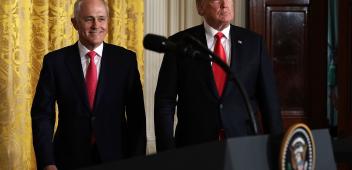Australia should rejoin the world's largest climate fund
Originally published in The Canberra Times, 23 September 2023.

After years as an international laggard, Australia is now trying to rebuild its international climate reputation.
Next month, the Green Climate Fund (GCF) - the world's largest multilateral climate fund - will hold a major summit to raise money for its upcoming replenishment.
Australia played a key role in setting up the GCF back in 2015, and even served as co-chair of its board, only for the previous government to pull out in 2018.
Despite its renewed focus on climate change, the Albanese government appears undecided on whether it will rejoin the GCF at its upcoming pledging conference in Bonn. Germany has already put forward what will be the single largest pledge in the Fund's history of 2 billion euros.
The United States has also followed through on an outstanding commitment of US$1 billion. Australia, meanwhile, remains the only major donor government still outside the fund.
Rejoining the GCF should be a priority as a matter of Australia's global climate credibility. That's especially so given the government's hope to co-host the 31st Conference of the Parties (COP) in 2026 with Pacific Island nations.
Indeed, rejoining is critical to Australia's strategic interests in the Pacific, responding to their existential concerns over climate change and strengthening Australia's influence in the context of rising geostrategic competition with China.
GCF is a lynchpin for global climate solidarity between rich countries and developing nations.
Despite only eight years of operation, it is now the world's largest and most important climate fund with a project portfolio worth over US$12 billion in developing countries around the world.
In the remote Pacific nation of Tuvalu the GCF is helping finance a transformative project to protect the country's coastline from rising sea levels. A solar power project in Senegal is another example, providing a low-carbon solution to rural electrification.
The Morrison government withdrew from the GCF citing concerns about governance and operational issues, opting instead to channel its climate finance bilaterally, particularly to the Pacific Islands.
However, a new report from the Lowy Institute shows that the GCF's performance has improved considerably and that the fund is now one of the most important sources of climate finance for the world's most vulnerable countries, including in the Pacific. Indeed, Pacific Island countries such as Tuvalu and Marshall Islands have been among the top beneficiaries of GCF funding, relative to the small size of their economies.
Notably, our analysis also shows that Australia's previously proactive involvement in the GCF was highly successful in unlocking large amounts of additional global climate finance for Australia's neighbours beyond its own GCF contribution - perhaps as much as $1.60 for every dollar Australia itself put in.
There is little doubt that the Pacific Islands - one of the most climate vulnerable regions in the world - are in dire need of substantially more climate finance, especially to help with adaptation. If Australia can unlock significant additional global funding for the region by rejoining the GCF, then this is extremely valuable.
More broadly, returning to the fund would signal a U-turn on the Morrison government's widely criticised exit and associated inaction on climate issues. It also seems essential to bolstering Australia's bid to co-host COP31, given that the GCF holds a special place within the COP negotiations.
Conversely, remaining outside the GCF would call into question the sincerity of Australia's international climate efforts.
Australia has, for instance, joined Germany's so-called "climate club", a group of nations which are supposed to push for much higher global climate ambition. Germany and other leading nations clearly see supporting developing countries through the GCF as a critical element of this.
Further, Australia sits on the transitional committee to create a new "loss and damage" fund to address climate impacts beyond what can be adapted to in the most vulnerable countries. But that role looks highly questionable if Canberra is not prepared to support the GCF, which it also played a key role in establishing.
Australia's renewed commitment to the GCF would not erase decades of inaction on domestic climate policies, a concern that the Pacific has long voiced. Rejoining is, however, one important way Australia can do its part in contributing to faster global climate action.



